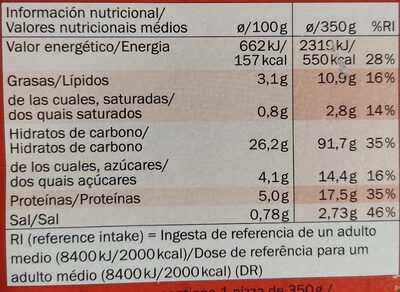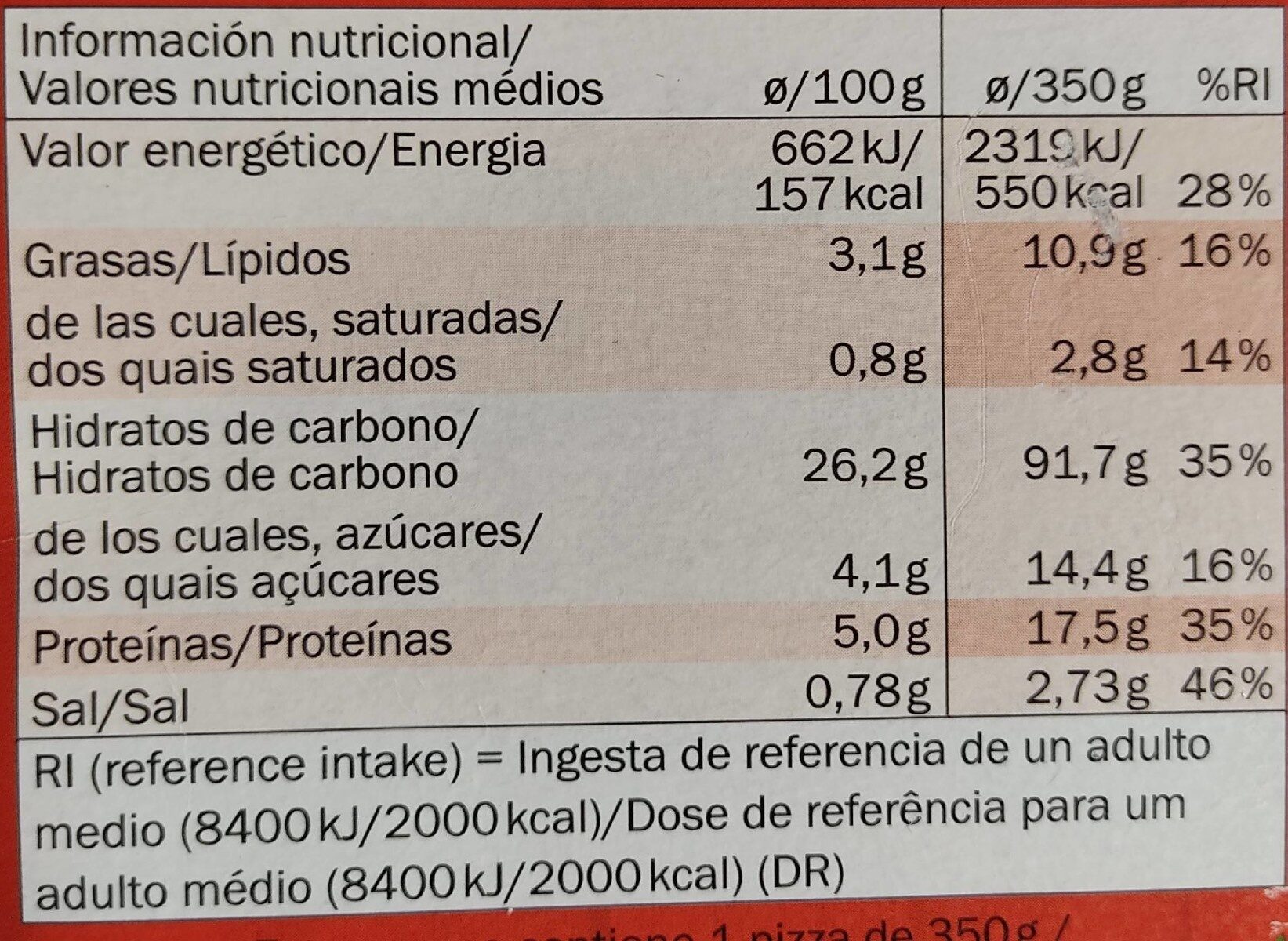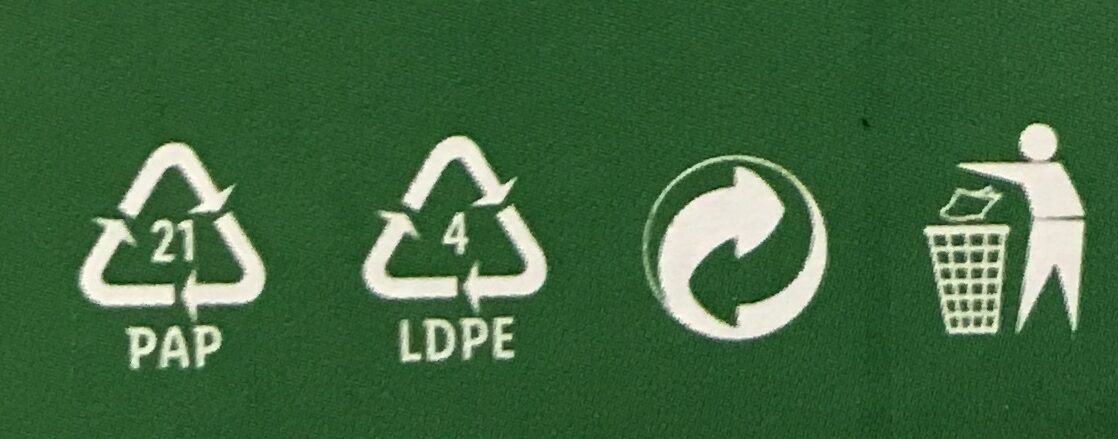Ajuda'ns a fer que la transparència alimentària sigui la norma!
Com a organització sense ànim de lucre, depenem de les vostres donacions per continuar informant els consumidors de tot el món sobre tot allò què mengen.
La revolució alimentària comença amb tu!
VEGANA - Pizza Bruschetta - Trattoria Alfredo - 350 g
VEGANA - Pizza Bruschetta - Trattoria Alfredo - 350 g
Codi de barres ambigu: aquest producte té un codi de barres amb número de circulació restringit per a productes d'una empresa. Això significa que diferents productors i botigues poden utilitzar el mateix codi de barres per a diferents productes.
×
Aquesta pàgina del producte no està completa. Podeu ajudar a completar-la editant-la i afegint-hi més dades a partir de les fotos ja disponibles, o fent-ne més amb l'aplicació de androide o iPhone / iPad. Gràcies!
×
Codi de barres: 20936549
Nom comú: Pizza végane garnie de sauce tomate, d'oignons et de tomates, précuite, surgelée
Quantitat: 350 g
Empaquetament: Cartó, 21 PAP, LDPE 4 - Polietilè de baixa densitat, fr:Fsc, fr:Green dot
Marques: Trattoria Alfredo
Categories: Aliments congelats, Menjar preparat, Pizzes i quiches, Pizzes, en:Vegetarian pizzas, Pastissos i pizzes congelades, en:Frozen pizzas, en:Vegetable pizza
Etiquetes, certificacions, premis:
Vegetarià, Vegà, Unió Vegetariana Europea, Unió Vegana Vegetariana Europea, FSC, Mix FSC, Punt verd, Fet a Alemanya



Origen del producte i / o dels seus ingredients: *d'origine végétale.
Llocs de fabricació o processament: Allemagne
Codi de traçabilitat: FSC-C012270
Botigues: Lidl
Països on es va vendre: República Txeca, França, Alemanya, Espanya, Suècia
Matching with your preferences
Salut
Ingredients
-
35 ingredients
Francès: Farine de blé, 26% tomates concassées, 17,1% tomates en dés, eau, 5,8% oignons, 5,79% tomates semi-séchées, margarine (huile de colza, graisses végétales (karité, coco)), eau, émulsifiants (lécithines (tournesol), mono - et diglycérides d'acides gras*) sel de cuisine, acidifiant (acide citrique), huile de colza, levure de boulanger, sucre, sel de cuisine, levain de blé, déshydraté oignon en poudre, ail, extrait de malt d'orge, poivre noir, 0,2% basilic, 0,002% origan, farine de malt grillé (blé, orge), carottes en poudre, jus de citron concentré, amidon modifié (pomme de terre).Al·lèrgens: en:GlutenRastres: en:Celery, en:Mustard, en:Sesame seeds, en:Soybeans
Processament d'aliments
-
Aliments ultra processats
Elements que indiquen que el producte està al grup 4 - Aliments i begudes ultraprocessats:
- Additiu: E14XX - Midó modificat
- Additiu: E322 - Lecitines
- Additiu: E471 - Monoglicèrids i diglicèrids d'àcids grassos
- Ingredient: Emulsionant
Els productes alimentaris es classifiquen en 4 grups segons el seu grau de processament:
- Aliments no processats o mínimament processats
- Ingredients culinaris processats
- Aliments processats
- Aliments ultra processats
La determinació del grup es fa en funció de la categoria del producte i dels ingredients que conté.
Additius
-
E322 - Lecitines
Lecithin: Lecithin -UK: , US: , from the Greek lekithos, "egg yolk"- is a generic term to designate any group of yellow-brownish fatty substances occurring in animal and plant tissues, which are amphiphilic – they attract both water and fatty substances -and so are both hydrophilic and lipophilic-, and are used for smoothing food textures, dissolving powders -emulsifying-, homogenizing liquid mixtures, and repelling sticking materials.Lecithins are mixtures of glycerophospholipids including phosphatidylcholine, phosphatidylethanolamine, phosphatidylinositol, phosphatidylserine, and phosphatidic acid.Lecithin was first isolated in 1845 by the French chemist and pharmacist Theodore Gobley. In 1850, he named the phosphatidylcholine lécithine. Gobley originally isolated lecithin from egg yolk—λέκιθος lekithos is "egg yolk" in Ancient Greek—and established the complete chemical formula of phosphatidylcholine in 1874; in between, he had demonstrated the presence of lecithin in a variety of biological matters, including venous blood, in human lungs, bile, human brain tissue, fish eggs, fish roe, and chicken and sheep brain. Lecithin can easily be extracted chemically using solvents such as hexane, ethanol, acetone, petroleum ether, benzene, etc., or extraction can be done mechanically. It is usually available from sources such as soybeans, eggs, milk, marine sources, rapeseed, cottonseed, and sunflower. It has low solubility in water, but is an excellent emulsifier. In aqueous solution, its phospholipids can form either liposomes, bilayer sheets, micelles, or lamellar structures, depending on hydration and temperature. This results in a type of surfactant that usually is classified as amphipathic. Lecithin is sold as a food additive and dietary supplement. In cooking, it is sometimes used as an emulsifier and to prevent sticking, for example in nonstick cooking spray.Origen: Wikipedia (Anglès)
-
E322i - Lecitina
Lecithin: Lecithin -UK: , US: , from the Greek lekithos, "egg yolk"- is a generic term to designate any group of yellow-brownish fatty substances occurring in animal and plant tissues, which are amphiphilic – they attract both water and fatty substances -and so are both hydrophilic and lipophilic-, and are used for smoothing food textures, dissolving powders -emulsifying-, homogenizing liquid mixtures, and repelling sticking materials.Lecithins are mixtures of glycerophospholipids including phosphatidylcholine, phosphatidylethanolamine, phosphatidylinositol, phosphatidylserine, and phosphatidic acid.Lecithin was first isolated in 1845 by the French chemist and pharmacist Theodore Gobley. In 1850, he named the phosphatidylcholine lécithine. Gobley originally isolated lecithin from egg yolk—λέκιθος lekithos is "egg yolk" in Ancient Greek—and established the complete chemical formula of phosphatidylcholine in 1874; in between, he had demonstrated the presence of lecithin in a variety of biological matters, including venous blood, in human lungs, bile, human brain tissue, fish eggs, fish roe, and chicken and sheep brain. Lecithin can easily be extracted chemically using solvents such as hexane, ethanol, acetone, petroleum ether, benzene, etc., or extraction can be done mechanically. It is usually available from sources such as soybeans, eggs, milk, marine sources, rapeseed, cottonseed, and sunflower. It has low solubility in water, but is an excellent emulsifier. In aqueous solution, its phospholipids can form either liposomes, bilayer sheets, micelles, or lamellar structures, depending on hydration and temperature. This results in a type of surfactant that usually is classified as amphipathic. Lecithin is sold as a food additive and dietary supplement. In cooking, it is sometimes used as an emulsifier and to prevent sticking, for example in nonstick cooking spray.Origen: Wikipedia (Anglès)
-
E330 - Acid citric
Citric acid: Citric acid is a weak organic acid that has the chemical formula C6H8O7. It occurs naturally in citrus fruits. In biochemistry, it is an intermediate in the citric acid cycle, which occurs in the metabolism of all aerobic organisms. More than a million tons of citric acid are manufactured every year. It is used widely as an acidifier, as a flavoring and chelating agent.A citrate is a derivative of citric acid; that is, the salts, esters, and the polyatomic anion found in solution. An example of the former, a salt is trisodium citrate; an ester is triethyl citrate. When part of a salt, the formula of the citrate ion is written as C6H5O3−7 or C3H5O-COO-3−3.Origen: Wikipedia (Anglès)
-
E471 - Monoglicèrids i diglicèrids d'àcids grassos
Mono- and diglycerides of fatty acids: Mono- and diglycerides of fatty acids -E471- refers to a food additive composed of diglycerides and monoglycerides which is used as an emulsifier. This mixture is also sometimes referred to as partial glycerides.Origen: Wikipedia (Anglès)
Anàlisi dels ingredients
-
Pot contenir oli de palma
Ingredients que poden contenir oli de palma: E471
-
Vegà
No s'han detectat ingredients no vegans
Ingredients no reconeguts: Margarina, Massa mare de blat
-
Vegetarià
No s'han detectat ingredients no vegetarians
Ingredients no reconeguts: Margarina, Massa mare de blat
-
Detalls de l'anàlisi dels ingredients
fr: Farine de blé, tomates concassées 26%, tomates en dés 17.1%, eau, oignons 5.8%, tomates semi-séchées 5.79%, margarine (huile de colza, graisses végétales de karité, graisses végétales de coco), eau, émulsifiants (lécithines de tournesol, mono- et diglycérides d'acides gras), sel de cuisine, acidifiant (acide citrique), huile de colza, levure de boulanger, sucre, sel de cuisine, levain de _blé_, oignon, ail, extrait de malt d'orge, poivre noir, basilic 0.2%, origan 0.002%, malt (blé, orge), carottes, jus de citron concentré, amidon modifié (pomme de terre)- Farine de blé -> en:wheat-flour - vegan: yes - vegetarian: yes - ciqual_proxy_food_code: 9410 - percent_min: 26 - percent_max: 36.508
- tomates concassées -> en:chopped-tomatoes - vegan: yes - vegetarian: yes - ciqual_food_code: 20047 - percent_min: 26 - percent: 26 - percent_max: 26
- tomates en dés -> en:tomato-cubes - vegan: yes - vegetarian: yes - ciqual_food_code: 20047 - percent_min: 17.1 - percent: 17.1 - percent_max: 17.1
- eau -> en:water - vegan: yes - vegetarian: yes - ciqual_food_code: 18066 - percent_min: 5.8 - percent_max: 16.308
- oignons -> en:onion - vegan: yes - vegetarian: yes - ciqual_food_code: 20034 - percent_min: 5.8 - percent: 5.8 - percent_max: 5.8
- tomates semi-séchées -> fr:tomates-semi-sechees - vegan: yes - vegetarian: yes - ciqual_food_code: 20047 - percent_min: 5.79 - percent: 5.79 - percent_max: 5.79
- margarine -> en:margarine - percent_min: 0.2 - percent_max: 5.79
- huile de colza -> en:colza-oil - vegan: yes - vegetarian: yes - from_palm_oil: no - ciqual_food_code: 17130 - percent_min: 0 - percent_max: 5.79
- graisses végétales de karité -> en:shea-butter - vegan: yes - vegetarian: yes - from_palm_oil: no - percent_min: 0 - percent_max: 2.895
- graisses végétales de coco -> en:coconut-oil - vegan: yes - vegetarian: yes - from_palm_oil: no - ciqual_food_code: 16040 - percent_min: 0 - percent_max: 1.93
- eau -> en:water - vegan: yes - vegetarian: yes - ciqual_food_code: 18066 - percent_min: 0.2 - percent_max: 5.06833333333333
- émulsifiants -> en:emulsifier - percent_min: 0.2 - percent_max: 4.31571428571429
- lécithines de tournesol -> en:sunflower-lecithin - vegan: yes - vegetarian: yes - percent_min: 0 - percent_max: 4.31571428571429
- mono- et diglycérides d'acides gras -> en:e471 - vegan: maybe - vegetarian: maybe - from_palm_oil: maybe - percent_min: 0 - percent_max: 2.15785714285714
- sel de cuisine -> en:salt - vegan: yes - vegetarian: yes - ciqual_food_code: 11058 - percent_min: 0.2 - percent_max: 0.78
- acidifiant -> en:acid - percent_min: 0.2 - percent_max: 0.78
- acide citrique -> en:e330 - vegan: yes - vegetarian: yes - percent_min: 0.2 - percent_max: 0.78
- huile de colza -> en:colza-oil - vegan: yes - vegetarian: yes - from_palm_oil: no - ciqual_food_code: 17130 - percent_min: 0.2 - percent_max: 0.78
- levure de boulanger -> en:baker-s-yeast - vegan: yes - vegetarian: yes - ciqual_food_code: 11045 - percent_min: 0.2 - percent_max: 0.78
- sucre -> en:sugar - vegan: yes - vegetarian: yes - ciqual_proxy_food_code: 31016 - percent_min: 0.2 - percent_max: 0.78
- sel de cuisine -> en:salt - vegan: yes - vegetarian: yes - ciqual_food_code: 11058 - percent_min: 0.2 - percent_max: 0.78
- levain de _blé_ -> en:wheat-sourdough - percent_min: 0.2 - percent_max: 0.78
- oignon -> en:onion - vegan: yes - vegetarian: yes - ciqual_food_code: 20034 - percent_min: 0.2 - percent_max: 0.78
- ail -> en:garlic - vegan: yes - vegetarian: yes - ciqual_food_code: 11000 - percent_min: 0.2 - percent_max: 0.78
- extrait de malt d'orge -> en:barley-malt-extract - vegan: yes - vegetarian: yes - percent_min: 0.2 - percent_max: 0.78
- poivre noir -> en:black-pepper - vegan: yes - vegetarian: yes - ciqual_food_code: 11015 - percent_min: 0.2 - percent_max: 0.78
- basilic -> en:basil - vegan: yes - vegetarian: yes - ciqual_food_code: 11033 - percent_min: 0.2 - percent: 0.2 - percent_max: 0.2
- origan -> en:oregano - vegan: yes - vegetarian: yes - ciqual_proxy_food_code: 11035 - percent_min: 0.002 - percent: 0.002 - percent_max: 0.002
- malt -> en:malt - vegan: yes - vegetarian: yes - percent_min: 0 - percent_max: 0.002
- blé -> en:wheat - vegan: yes - vegetarian: yes - ciqual_proxy_food_code: 9410 - percent_min: 0 - percent_max: 0.002
- orge -> en:barley - vegan: yes - vegetarian: yes - percent_min: 0 - percent_max: 0.002
- carottes -> en:carrot - vegan: yes - vegetarian: yes - ciqual_food_code: 20009 - percent_min: 0 - percent_max: 0.002
- jus de citron concentré -> en:concentrated-lemon-juice - vegan: yes - vegetarian: yes - ciqual_food_code: 2028 - percent_min: 0 - percent_max: 0.002
- amidon modifié -> en:modified-starch - vegan: yes - vegetarian: yes - ciqual_proxy_food_code: 9510 - percent_min: 0 - percent_max: 0.002
- pomme de terre -> en:potato - vegan: yes - vegetarian: yes - ciqual_food_code: 4003 - percent_min: 0 - percent_max: 0.002
Nutrició
-
Bona qualitat nutricional
⚠ ️Atenció: la quantitat de fibra no s'especifica, no es tindrà en compte la seva possible contribució positiva en la qualificació.⚠ ️Atenció: la quantitat de fruita, verdura i fruits secs no s'especifica a l'etiqueta, s'ha fet una estimació a partir de la llista d'ingredients: 55Aquest producte no es considera una beguda per al càlcul de la Nutri-Score.
Punts positius: 4
- Proteïnes: 3 / 5 (valor: 5, valor arrodonit: 5)
- Fibra: 0 / 5 (valor: 0, valor arrodonit: 0)
- Fruites, verdures, fruits secs i olis de colza/nou/oliva: 1 / 5 (valor: 55.5413129882813, valor arrodonit: 55.5)
Punts negatius: 4
- Energia: 1 / 10 (valor: 662, valor arrodonit: 662)
- Sucres: 0 / 10 (valor: 4.1, valor arrodonit: 4.1)
- Greixos saturats: 0 / 10 (valor: 0.8, valor arrodonit: 0.8)
- Sodi: 3 / 10 (valor: 312, valor arrodonit: 312)
Els punts per proteïnes es compten perquè els punts negatius són inferiors a 11.
Puntuació nutricional: (4 - 4)
Nutri-Score:
-
Nivells de nutrients
-
Greix en Quantitat moderada (3.1%)
Què us cal saber- Un alt consum de greixos, especialment de greixos saturats, pot augmentar el colesterol, que augmenta el risc de patir malalties del cor.
Recomanació: Reduïu el consum de greixos i greixos saturats- Trieu productes amb menys greixos i greixos saturats.
-
Àcid gras saturat en baixa quantitat (0.8%)
Què us cal saber- Un alt consum de greixos, especialment de greixos saturats, pot augmentar el colesterol, que augmenta el risc de patir malalties del cor.
Recomanació: Reduïu el consum de greixos i greixos saturats- Trieu productes amb menys greixos i greixos saturats.
-
Sucre en baixa quantitat (4.1%)
Què us cal saber- Un alt consum de sucre pot provocar augment de pes i càries dental. També augmenta el risc de patir diabetis tipus 2 i malalties cardiovasculars.
Recomanació: Limitau el consum de sucre i de begudes ensucrades- Les begudes ensucrades (com ara refrescos, begudes de fruites i sucs i nèctars de fruites) s'han de limitar tant com sigui possible (no més d'1 got al dia).
- Triau productes amb menor contingut de sucre i reduïu el consum de productes amb sucres afegits.
-
Sal comuna en Quantitat moderada (0.78%)
Què us cal saber- Un alt consum de sal (o sodi) pot provocar un augment de la pressió arterial, que pot augmentar el risc de patir malalties del cor i ictus.
- Moltes persones que tenen hipertensió no ho saben, ja que sovint no en tenen símptomes.
- La majoria de la gent consumeix massa sal (de 9 a 12 grams de mitjana al dia), al voltant del doble del nivell màxim d'ingesta recomanat.
Recomanació: Limitau la ingesta de sal i d'aliments rics en sal- Reduïu la sal que emprau quan cuinau, i no afegiu sal a taula.
- Limiteu el consum d'aperitius salats i trieu productes amb menor contingut de sal.
-
-
Informació nutricional
Informació nutricional Com es ven
per 100 g/100 mlCom es ven
per porció (350 g)Comparat amb: en:Vegetable pizza Energia 662 kj
(157 kcal)2.320 kj
(550 kcal)-15% Greix 3,1 g 10,8 g -44% Àcid gras saturat 0,8 g 2,8 g -60% Hidrats de carboni 26,2 g 91,7 g +5% Sucre 4,1 g 14,3 g +34% Fiber ? ? Proteïna 5 g 17,5 g -26% Sal comuna 0,78 g 2,73 g -24% Fruits‚ vegetables‚ nuts and rapeseed‚ walnut and olive oils (estimate from ingredients list analysis) 55,541 % 55,541 %
Entorn
-
Eco-puntuació C - Impacte ambiental moderat
El Eco-Score és una puntuació experimental que resumeix els impactes ambientals dels productes alimentaris.→ L'Eco-Score es va desenvolupar inicialment a França i s'està ampliant per a altres països europeus. La fórmula Eco-Score està subjecta a canvis, ja que es millora periòdicament per fer-la més precisa i més adequada per a cada país.Anàlisi del cicle de vida
-
Impacte mitjà dels productes de la mateixa categoria: B (Score: 60/100)
Categoria: Pizza, vegetables or pizza 4 seasons
Categoria: Pizza, vegetables or pizza 4 seasons
- Puntuació ambiental PEF ( petjada ambiental de l'aliment ): 0.43 (com més baixa sigui la puntuació, menor serà l'impacte)
- incloent l'impacte sobre el canvi climàtic: 3.26 kg CO₂ eq/kg del producte
Etapa Impacte Agricultura
69.4 %Processament
12.5 %Empaquetament
3.9 %Transport
4.2 %Distribució
2.1 %Consum
7.9 %
Bonificacions i punts negatius
-
Falta informació sobre l'origen dels ingredients
Punts negatius: -5
⚠ ️ L'origen dels ingredients d'aquest producte no està indicat.
Si estan indicats a l'embalatge, podeu modificar la fitxa del producte i afegir-los.
Si sou el fabricant d'aquest producte, podeu enviar-nos la informació amb la nostra plataforma gratuïta per a productors.
-
Embalatge d'impacte mitjà
Punts negatius: -9
Forma Material Reciclatge Impacte Unknown 21 PAP Baix Unknown LDPE 4 - Polietilè de baixa densitat Alt ⚠ ️ La informació sobre l'embalatge d'aquest producte no és prou precisa (formes i materials exactes de tots els components de l'embalatge).⚠ ️ Per a un càlcul més precís de l'Eco-Score, podeu modificar la pàgina del producte i afegir-los.
Si sou el fabricant d'aquest producte, podeu enviar-nos la informació amb la nostra plataforma gratuïta per a productors.
Eco-Score per a aquest producte
-
Impacte per a aquest producte: C (Score: 46/100)
Producte: VEGANA - Pizza Bruschetta - Trattoria Alfredo - 350 g
Puntuació de l'anàlisi del cicle de vida: 60
Suma de bonificacions i punts negatius: -14
Puntuació final: 46/100
-
Petjada de carboni
-
Equivalent a conduir 1.7 km en un cotxe de gasolina
326 g de CO² per cada 100 g de producte
La xifra d'emissions de carboni prové de la base de dades Agribalyse d'ADEME, per a la categoria: Pizza, vegetables or pizza 4 seasons (Font: Base de dades ADEME Agribalyse)
Etapa Impacte Agricultura
74.8 %Processament
9.1 %Empaquetament
5.1 %Transport
7.0 %Distribució
1.1 %Consum
2.8 %
Empaquetament
-
Embalatge d'impacte mitjà
-
Peces d'embalatge
(21 PAP)
(LDPE 4 - Polietilè de baixa densitat)
-
Materials d'embalatge
Material % Pes de l'embalatge Pes de l'embalatge per 100 g de producte Paper or cardboard Plàstic Total
-
Transport
-
Orígens dels ingredients
Falta informació sobre l'origen dels ingredients
⚠ ️ L'origen dels ingredients d'aquest producte no està indicat.
Si estan indicats a l'embalatge, podeu modificar la fitxa del producte i afegir-los.
Si sou el fabricant d'aquest producte, podeu enviar-nos la informació amb la nostra plataforma gratuïta per a productors.Add the origins of ingredients for this product Add the origins of ingredients for this product
Report a problem
-
Incomplete or incorrect information?
Category, labels, ingredients, allergens, nutritional information, photos etc.
If the information does not match the information on the packaging, please complete or correct it. Open Food Facts is a collaborative database, and every contribution is useful for all.
Fonts de dades
Producte afegit per kiliweb
Última modificació de la pàgina del producte per tasja.
La pàgina del producte, també editada per anticultist, foodrepo, inf, marmotte73, musarana, neptuno, nicobur, olofolleola4, openfoodfacts-contributors, packbot, quechoisir, risajanda, roboto-app, segundo, thaialagata, twoflower, vege-freek, yuka.L4JpOI_bQ_QuM8P48N8Y1zaUBsPHX9h7E3BVog, yuka.UXFBcEQ2OWVtLzBrb01JUDlDclAzc05uN01LZ2ZtZXdKL0lzSVE9PQ, yuka.VzRjT0lxSXMrTjhqdWM4NDdpdlp4ZEZJeks2NFcyKzlGT2s0SVE9PQ.












